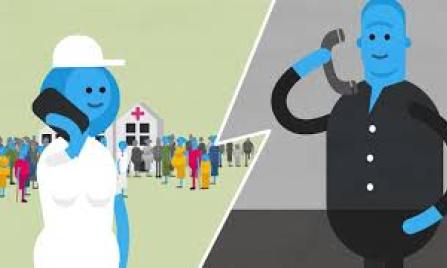-
Who we are
WHO WE AREThe International Organization for Migration (IOM) is part of the United Nations System as the leading inter-governmental organization promoting since 1951 humane and orderly migration for the benefit of all, with 175 member states and a presence in 171 countries.
-
Our Work
Our WorkAs the leading inter-governmental organization promoting since 1951 humane and orderly migration, IOM plays a key role to support the achievement of the 2030 Agenda through different areas of intervention that connect both humanitarian assistance and sustainable development.
What We Do
What We Do
Partnerships
Partnerships
Highlights
Highlights
- Where we work
-
Take Action
Take Action
Work with us
Work with us
Get involved
Get involved
- Data and Research
- 2030 Agenda
A crisis can erupt over several different factors, including unresolved tensions over land or water, grievances related to political or socio-economic marginalization, climate change related issues or recruitment by violent armed groups. If not addressed, these factors can constrain populations from transitioning toward sustainable recovery and durable solutions to displacement.
Alongside recovery needs – such as restoration of livelihoods, access to services or housing – the social dimensions that keep displaced populations in vulnerable situations also need to be resolved.
In fragile situations where there is a risk of deterioration into humanitarian crisis or displacement and in situations where communities are recovering from crises, IOM invests in affected communities and their leaders to empower civil society and prevent future crises and enhance human rights.
- Humanitarian-Development-Peace Nexus
-
The Organization is present in countries before, during and after crises and leverages its capacities across sectors to build partnerships and implement effective responses across the Humanitarian-Development-Peace Nexus (HDPN).
IOM’s humanitarian assistance ensures the immediate needs of affected populations are met, while its transition, peacebuilding and development-oriented programming help to build resilience and self-reliance; restore peace and security; and enhance the well-being of displaced persons and host communities.
Prior to a crisis, early warning and preparedness actions lead to more effective response and recovery. IOM begins planning early for long-term resilience, transition and recovery. The Organization works within the UN Country Teams, alongside governments to support frameworks and build capacity. IOM also works with communities and local authorities to build resilience, reduce risk and prepare effective responses to future crises.
During a crisis, IOM’s humanitarian protection and assistance activities aim to support long-term dividends and positively influence the capacity of affected communities to build self-reliance and recover from crisis.
In camps or camp-like settings, the Organization ensures that internal governance structures are in place to facilitate informed decision-making processes and ensure displaced persons actively participate in identifying solutions to their displacement. Similarly, shelter activities build on local climate-smart construction practices and material and deliver shelter solutions that communities can own and lead through their recovery process. IOM also delivers cash-based assistance across various sectors, a modality that helps populations meet their needs and priorities.
In line with IOM’s Progressive Resolution to Displacement Situations approach, the Organization’s efforts towards durable solutions involve initiatives undertaken at individual, community and structural levels.
- Community-Based Approaches
-
Communities are at the frontlines of crises around the world, whether they are hosting displaced populations, receiving returning populations or experiencing displacement.
The more resilient the community, the more they will be able to withstand the impacts of a crisis or to overcome the challenges associated with the sudden arrival or departure of populations.
Well-designed community-based approaches are more likely to successfully contribute to their well-being and drive sustainable solutions that lead to recovery and development.
IOM’s entry points for these investments occur before a crisis, during humanitarian responses and throughout the recovery and development phases. The Organization draws on participatory methods throughout its work so that populations are empowered in the decisions that affect their lives.





